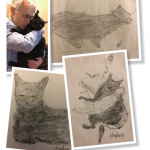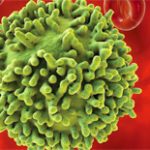“I want to close by acknowledging the most important people in my life. My days are enriched by my husband, Jerry Gliklich, who values my work and shares my passion for medicine, and my children, who still think that having a physician-scientist for a mom is cool. When they were young, they would come home from school and ask, ‘Mom, what did you discover today?’
“Of course, discoveries are hard to come by, they don’t occur every day. Nevertheless, if we, the lupus community, commit to working together, if we share our successes and resources, and if we mentor and empower young physician-scientists, many important and life-altering discoveries lie in our future.”
About Dr. Tsokos
Dr. Gilkeson also introduced Dr. Tsokos:
“Dr. George C. Tsokos began his distinguished career at the University of Athens, where he received his medical degree. He went on to complete his medical residency at the University of Athens and Georgetown University in Washington, D.C., and his rheumatology and clinical immunology training at the National Institutes of Health.
“George spent much of his career as a member of the Uniformed Services and Walter Reed community, where he served in various positions, including vice chair for research in the Department of Medicine and Chief of the Department of Cell Injury.
“In 2007, George joined Beth Israel Deaconess Medical Center as chief of rheumatology and Harvard Medical School as professor of medicine. Upon his arrival, he set out working to build a comprehensive Lupus Center of Excellence.
“George is recognized as one of the leaders of modern lupus research. Although it is now widely acknowledged that abnormalities in T cell signaling play a role in the development of lupus, that was not the case when George began his career more than 30 years ago.
“George’s seminal studies in T cell signaling went against the popular belief that B cells were the only immune cells involved in lupus. His early research described the presence of activated T cells and the lack of antigen-specific suppressor cells in patients with lupus.
“George was the first to show that engagement of the T cell receptor–CD3 complex in T cells triggers abnormal signaling responses. Pursuing this observation, George discovered that inhibition of the signaling molecule SYK in mice contributed to lupus. These findings have led to the development of highly innovative therapeutic interventions targeting the SYK gene in patients with lupus, which are currently in clinical trials.

